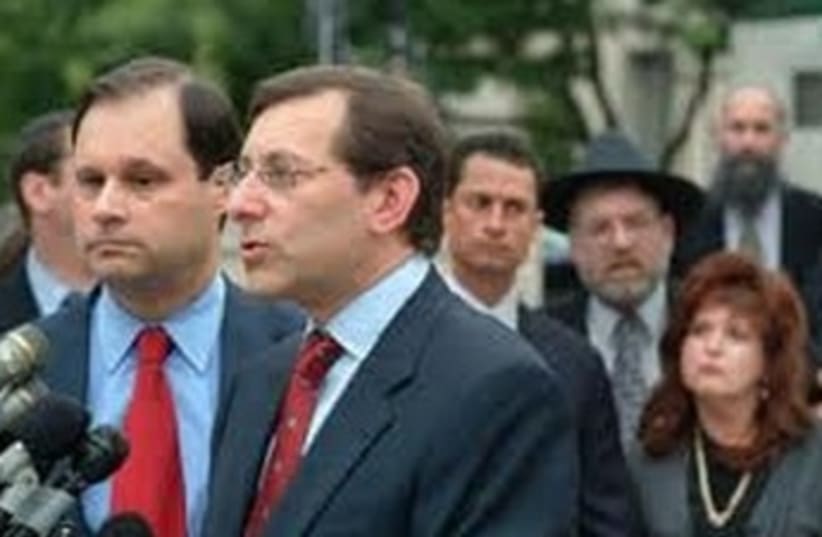As pro bono attorneys for Jonathan Pollard since 2000, we never cease to be amazed at how those who are hostile to Pollard feel compelled to make up facts.Evidently, these adversaries recognize that the actual facts are not sufficient to justify keeping Pollard in prison any longer, as he has already served over 28 years for delivering classified information to the State of Israel.The most recent manifestation of this phenomenon appears in an opinion piece in the online edition of The New York Times by M.E. Bowman, titled “Don’t trust this spy.”
Bowman makes a series of false and inflammatory allegations that are contradicted by the public court record. Since Bowman would be committing a crime were he to reveal anything contained in the non-public, classified portion of the court record, it is fair to presume that he is not doing so. Since his assertions are nowhere to be found in (and indeed, are contradicted by) the public court record, the only possible conclusion is that his allegations are false.For example, Bowman now claims that Pollard supposedly “sold the daily report from the US Navy’s Sixth Fleet Ocean Surveillance Facility in Rota, Spain.”That allegation is nowhere to be found in the public court record.Moreover, it is contradicted by the 1987 CIA report which concluded that Israel never even requested information from Pollard concerning “US military activities, plans, capabilities or equipment.” Twenty-eight years after the fact, Bowman has now invented this allegation, evidently for the purpose of trying to impede the powerful wave of support for Pollard’s release.Bowman’s statement is also incompatible with the Victim Impact Statement submitted by the prosecution to the sentencing judge in 1987. The Victim Impact Statement – the pre-sentencing court document in which the victim of a crime (in this case, the United States itself) describes the damage it has suffered – sets forth the actual damage to the US as follows: “Mr. Pollard’s unauthorized disclosures have threatened the US [sic] relations with numerous Middle East Arab allies, many of whom question the extent to which Mr. Pollard’s disclosures of classified information have skewed the balance of power in the Middle East. Moreover, because Mr. Pollard provided the Israelis virtually any classified document requested by Mr. Pollard’s co-conspirators, the US has been deprived of the quid pro quo routinely received during authorized and official intelligence exchanges with Israel, and Israel has received information classified at a level far in excess of that ever contemplated by the National Security Council. The obvious result of Mr. Pollard’s largesse is that US bargaining leverage with the Israeli government in any further intelligence exchanges has been undermined. In short, Mr. Pollard’s activities have adversely affected US relations with both its Middle East Arab allies and the government of Israel.”The Victim Impact Statement reflects – at worst – short-term friction between the US and unnamed Arab countries, and temporary reduction in bargaining leverage by the US, rather than the severe damage now described by Bowman.While it would require many pages to catalog each of the falsehoods in Bowman’s article, a few examples will suffice. He claims that Pollard pleaded guilty to a charge that could have resulted in the death penalty. That is categorically false. He never pleaded guilty to any such charge, nor was he accused of a capital offense.Bowman also suggests that Pollard pleaded guilty to a statute which criminalizes disclosure that might result in the death of an agent. But Bowman chooses not to mention that the public record contains an undisputed statement that no agents lost their lives as a result of anything Pollard did.Bowman accuses Pollard of “treason,” when he surely knows that treason involves aiding an enemy of the US. Pollard was not charged with, and could not have been charged with, treason, because his espionage was for an ally, not an enemy. And Bowman opts not to mention that Pollard was not charged with intending to harm the US, even though such a charge can be brought if the facts support it.Bowman is hardly the only person who has knowledge of Pollard’s case. He mentions former CIA director R. James Woolsey, Jr., and former assistant secretary of defense Lawrence Korb, both distinguished former government officials who have spoken out in favor of releasing Pollard. Bowman omits to mention that these two are but the tip of a very large and impressive iceberg, as many former high-ranking government officials have called for Pollard’s release.They include George Shultz, who served as secretary of state at the time of the case; Robert “Bud” McFarlane, who served as national security adviser at the time of the case; former attorney-general Michael Mukasey; former secretary of state Henry Kissinger; former vice president Dan Quayle; four former chairs of the Senate Intelligence Committee; and dozens of senators and members of Congress.Bowman also neglects to mention that secretary of defense Caspar W. Weinberger (whose affidavit Bowman cites as proof of his position) admitted years later in an interview with prominent journalist Edwin Black that the Pollard case was “a very minor matter, but made very important... It was made far bigger than its actual importance.” Those words cannot be reconciled with Bowman’s inflammatory statements.In the face of this groundswell of support for a very belated measure of justice for Pollard, Bowman apparently feels the need to make his opposing view heard. Bowman is entitled to his opinion. But he is not entitled to invent facts in order to support it.As a matter of simple justice, the actual facts compel Jonathan Pollard’s release after over 28 years behind bars.The writers have served as pro bono attorneys for Jonathan Pollard since 2000.After 28 years, Pollard deserves facts, not fiction
As pro bono attorneys for Jonathan Pollard since 2000, we never cease to be amazed at how those who are hostile to Pollard feel compelled to make up facts.
